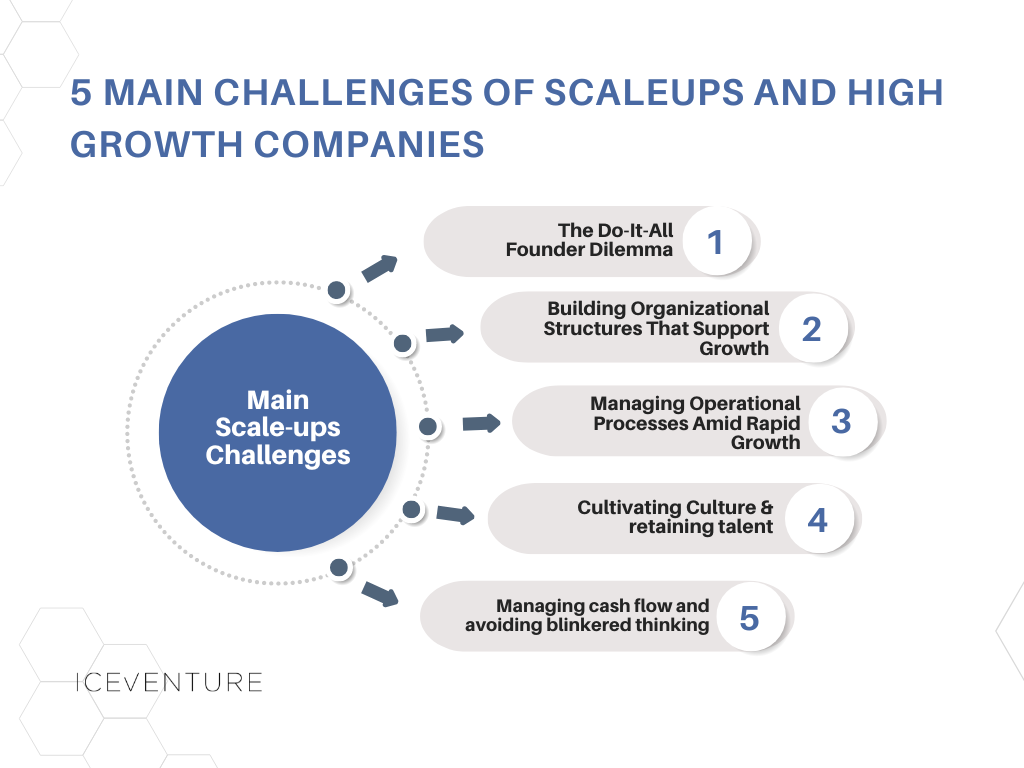
#1 The Do-It-All Founder Dilemma
As your company transitions from startup to scale-up, the pressure on founders and managers—often inexperienced—can become overwhelming. A few questions you should ask yourselves are: Can your leadership keep pace with your growth? Do you know who’s accountable for each process? Are you delegating enough? And last but not least: are you ready to handle the increasing risks—whether financial, legal, or related to your team?
Action: It’s time to step away from doing the day-to-day work and focus on leading. Your priority now is to create momentum, guide the team, and make sure that projects align with the company’s goals. Offload repetitive tasks like invoicing or candidate screening so you can concentrate on higher-level strategy. This shift is crucial if you want your leadership to grow alongside your business.
#2 Building Organizational Structures That Support Growth
We have seen firsthand that building a scalable organizational structure is essential as scale-ups shift away from a founder-centric model. In startups, problems can often be solved quickly through direct communication; with 50 employees, this is more difficult. Without clear structures, you risk bottlenecks, unclear responsibilities, and operational inefficiencies that can slow down growth.
Action: Use organizational development to build scalable organizational models that align with your growth objectives while still allowing the flexibility you need. You may not need formal org charts in the early stages, but you should know who is responsible for what, ensure communication flows smoothly, and delegate effectively. Create a culture of accountability and promote clear communication across the team.
#3 Managing Operational Processes Amid Rapid Growth
One of the key takeaways we got during this year’s European Scaleup Conference in Rome came from Matteo Berlucchi, serial entrepreneur and angel investor:
“Taking care of internal processes and corporate culture often comes too late.” Let’s start with processes.
The rapid growth of a company can put significant pressure on its operational processes. One of the toughest challenges is scaling these processes to meet rising demand while maintaining consistent quality. As the company grows, the gap between employees and management widens, making it harder to spot problems early on, which can lead to reactive, on-the-fly adaptations. Additionally, growth and the heavier workload that come with it can strain personnel, potentially leading to burnout. Lastly, infrastructure overload can occur as systems struggle to keep up.
Action: Consider the impact of scaling on your current processes. Ask yourself, "What will happen if we increase by 10 times?" – this is crucial. According to Forbes, the #1 reason of startup death is premature scaling, before the operations and product are ready.
You will need to establish structured, repeatable processes to make operations more predictable and reduce the mental strain of constantly reacting to issues. Documenting these processes ensures that you won't have to explain them each time someone new joins the team. Regularly review your processes to identify inefficiencies, automate routine tasks, and use data analytics for real-time insights. Pay attention to staff well-being to prevent burnout, and ensure that your infrastructure and technology are ready to support growth without compromising quality or efficiency. Always think in terms of the 3Ps: people, platforms, and processes—these core elements must scale together for sustainable success.
#4 Cultivating Culture & retaining talent
In scale-ups, culture is still evolving as new team members bring fresh perspectives. The challenge is building a cohesive culture that supports growth objectives while allowing for organic development. Company culture is more than a set of values—it can be the key differentiator between short-term success and long-term sustainability. People are the foundation of any culture, and once you’ve built a team that reflects the culture you aspire to, it’s critical to retain high-performing talent and attract new individuals who fit your vision.
This requires a coordinated effort across recruitment, development, and retention strategies. As your company scales, managing talent and culture in tandem becomes essential to ensure organizational stability and long-term success.
Action: Recognize that your company’s culture will evolve as it scales. Begin by defining core values that align with your growth goals, but be prepared to revisit and adapt them over time. Focus on hiring individuals who reflect these values, using structured onboarding processes, leadership development, and employee engagement strategies to ensure cultural alignment.
Career development is equally important. Start planning for the long-term growth of your team by implementing clear career paths and professional development opportunities. People Operations should eventually take ownership of this process, but leadership needs to set the foundation early. Offer customized training programs, competitive compensation packages, and leadership initiatives to retain top talent. These efforts will help integrate new hires, maintain cultural continuity, and ensure your organization is prepared for sustained growth.
Alaiko, founded in 2020 and already with over 135 employees, serves as a valuable example of how to establish and maintain a flourishing culture amidst rapid expansion. They defined their values before hiring, hired culture ambassadors, and implemented intensive onboarding weeks at Alaiko’s Munich headquarters, even for remote hires. Read more here – European Scaleup Monitor 2023.
#5. Managing cash flow and avoiding blinkered thinking
As your company scales to meet growing demand, it’s common to purchase large quantities of materials, hire new employees, and invest in new locations—even when the infrastructure for expansion is not fully in place. If these expansions succeed, your investments in materials, locations, and people will convert into products, driving anticipated sales growth. However, this aggressive approach often ties up cash in inventory, and customer payments can take months to materialize. If the expected sales fall short, the company may face liquidity problems with the risk of insolvency becomes very real.
It is crucial to avoid blinkered thinking—focusing on growth at all costs without considering the financial implications. A historical example is Osborne Computers, which sold its products below cost to maintain rapid growth. Although this strategy drove record sales, it led to bankruptcy soon after.
Action: It is essential to manage cash flow more carefully as many aspects of the business rely on it, and obtaining larger funding takes longer. Ultimately, the finance department should be responsible for this.
Forecasting becomes significantly more important. Sales, hiring, and delivery forecasts should all be taken into consideration.
It is important to set goals and ensure effective management of the company by closely monitoring the financials (creating a dashboard is highly recommended).
Managing grow effectively – a last word
Growth is the ongoing goal for most company, whether a startup or a large corporation. However, many startups excel at generating demand through their marketing efforts but often overlook the need to scale their capacity to handle that demand effectively.
Handling growth comes with significant challenges that can make or break an organization. As we've outlined, moving from a startup to a scale-up demands strategic leadership, organizational development and role definition, clear operational processes, company culture, and good cash flow management. Successfully navigating these challenges hinges on your ability to adapt, delegate, and plan ahead.
By addressing these five key challenges—founder-led management, building scalable structures, managing operational processes, cultivating company culture, and safeguarding cash flow—you lay the foundation for sustainable growth. Remember, the goal is not just to grow bigger but to grow more efficiently.
If you need additional support, our "Managing Growth" workshop equips you with the knowledge to develop a scalable organization, foster the right culture, manage cash flow wisely, and align operations with market demands. In just one day, you'll gain practical insights and proven strategies to confidently guide and sustain your company's growth.
About Iceventure
Iceventure, now headquartered in Rome as of 2024, is a niche entrepreneurial consultancy specializing in strategy consulting, business development, innovation, and business intelligence. Our team advises clients across Germany, Italy, the EU, and globally, employing a networked consulting approach critical for the 21st century. This approach integrates detailed sector analysis, global market insights, and an understanding of value creation, supported by our team's extensive experience across finance, innovation, startups, and various industries.

 Scaling a company is a demanding process: only
Scaling a company is a demanding process: only